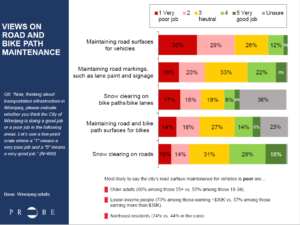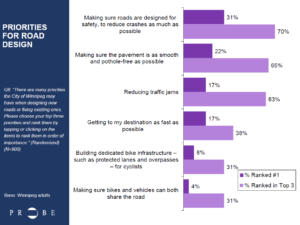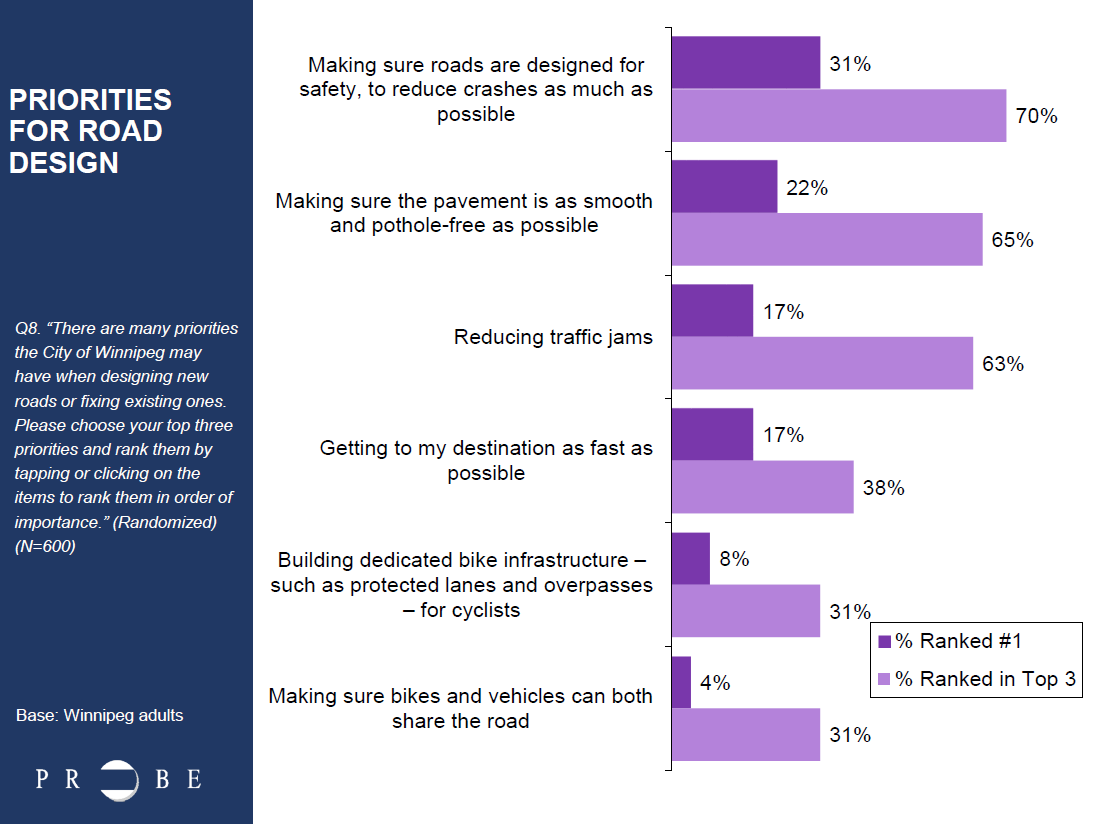Final part in three-part series recommends ways to move Winnipeg forward as a world-class, winter city with accessible, safe roads and bike paths for all
WINNIPEG, August 29, 2018 – Today, CAA Manitoba and Bike Winnipeg release their list of recommendations to improve the community ahead of the civic election. The recommendations focus mainly on road maintenance, safety, usability and design, grew out of the top concerns identified by Winnipeggers in the cycling and driving poll conducted by Probe Research in June.
Road and bike path maintenance emerged as the community’s top issue, with the majority (59 per cent) of Winnipeggers polled saying road surface maintenance is poor, while 36 per cent noted lane paint and signage needs improvement.

Road and bike path maintenance emerged as the community’s top issue, with the majority (59 per cent) of Winnipeggers polled saying road surface maintenance is poor, while 36 per cent noted lane paint and signage needs improvement.
“If we want to be a world-class city, we can start by making small changes through maintenance like reinstating the fall street sweeping program,” said Liz Kulyk, corporate manager of government and community relations at CAA Manitoba. “It’s unacceptable that lane paint is often so faded people have to guess where the lanes are – and this, along with potholes and cracks, creates serious safety hazards for drivers and cyclists.”
Citizens also identified the need to design roads for safety to reduce collisions as much as possible. Mark Cohoe, executive director of Bike Winnipeg, notes that when it comes to safety, road design and maintenance are critically linked – if you have one without the other, the safety impact is not very effective overall. Protected bike lanes are an example of a cycling facility that has been shown to increase safety for all road users, and one which emerged as a high priority for Winnipeggers in the poll.

Respondents identified the need to design roads for safety to reduce collisions as much as their top priority for roadway design.
“As a proud winter city, snow is always going to be a reality in Winnipeg. Many cities have found ways to provide timely and effective snow clearing along their cycling networks, and Winnipeg needs to ensure that it too provides citizens with an effective, connected cycling network that is cleared on a timely basis.” Cohoe says. “That needs to include faster removal of snowbanks, which reduce visibility and create safety issues for all road users.”
Recommendations around maintenance and safety from both groups to the City of Winnipeg are:
- Reinstate the cancelled fall street sweeping program to address accumulation of material at curbs that create slippery situations for cyclists, forcing them farther into vehicle traffic. This material also clogs drainage systems and when water sits on the road, it degrades the pavement faster – resulting in more repairs and financial investment over time.
- Prioritize roads with bike lanes in the lane painting hierarchy and plan to ensure they are done first to increase safety for all road users.
- Undertake a proactive community stewardship campaign empowering citizen to request lane painting if markings are faded and report damaged, missing or unclear road signage through a one-touch button to be added in the 311 app or by phone.
- Increase by 25% the number of locations where high visibility green paint cautions road users they’re approaching conflict points, such as sidewalks, driveways and intersections where bikes, cars and pedestrians interact.
- By 2019, commit to investigate, and engage in proper public consultation, on options such as reducing residential speed limits or adding traffic calming measures on main cycling routes.
- Commit to purchase social media advertising that promotes educational or awareness campaigns regarding new facilities requiring behavioural changes, such as the no-right-on-red signs installed along the McDermot/Bannatyne bike lane corridor.
Both agree that the city should better leverage community stakeholders, like CAA Manitoba and Bike Winnipeg, to help get their message out about plans to build or how to use new infrastructure.
The recommendations have been shared with the mayor’s office and the City of Winnipeg public administration. To view the full recommendations list, please visit caamanitoba.com/newsroom.
Probe Research surveyed a random representative sample of 600 adults residing in Winnipeg between June 5 and 19, 2018. The survey sample size offers 95 per cent certainty that results are within plus or minus 4.0 percentage points of what they would be if the entire adult population of Winnipeg had been studied.
About CAA Manitoba:
Since its inception in 1903, CAA Manitoba has been a non-profit, member-driven organization that advocates for road safety and the Canadian traveler, however they choose to commute.
About Bike Winnipeg:
As a non-profit, volunteer-run organization, Bike Winnipeg advocates for increased cycling awareness in Manitoba and works to make cycling in Winnipeg a safe, convenient, accessible and enjoyable transportation choice year-round.
Complete list of Recommendations – Road Maintenance and Safety Information
Full Text of News Release (as pdf)
